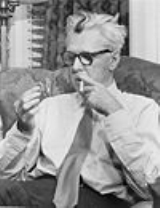
author
, cartoonist
and celebrated wit
. Thurber was best known for his cartoons
and short stories
published in The New Yorker
magazine.
Thurber was born in Columbus
, Ohio
, to Charles L. Thurber and Mary Agnes (Mame) Fisher Thurber on December 8, 1894. Both of his parents greatly influenced his work. His father, a sporadically employed clerk and minor politician who dreamed of being a lawyer or an actor, is said to have been the inspiration for the small, timid protagonist typical of many of his stories.
Le coeur a ses raisons, Mrs. Bence, que la raison ne connait pas. ![]()
Well, if I called the wrong number, why did you answer the phone?![]()
I love the idea of there being two sexes, don't you?![]()
He knows all about art, but he doesn't know what he likes.![]()
Precision of communication is important, more important than ever, in our era of hair trigger balances, when a false or misunderstood word may create as much disaster as a sudden thoughtless act.![]()
There are two kinds of light — the glow that illumines, and the glare that obscures.![]()
A burden in the bush is worth two on your hands.![]()
It is better to ask some of the questions than to know all the answers.![]()
There is no safety in numbers, or in anything else.![]()
Early to rise and early to bed makes a male healthy and wealthy and dead.![]()

